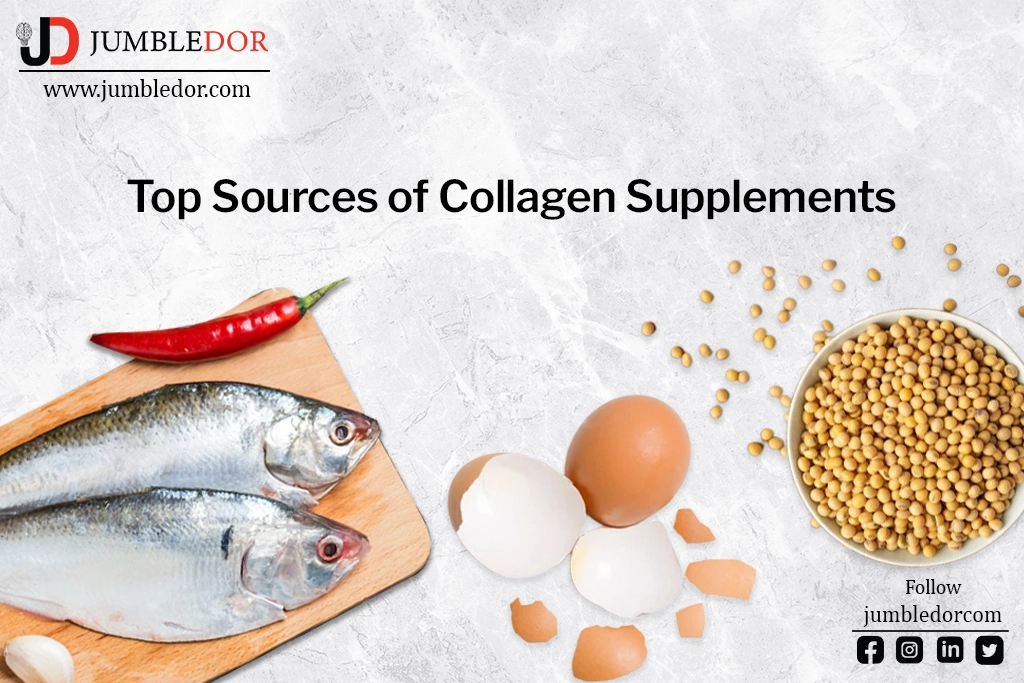Collagen is a protein that is used to make the connective tissue in the body. It’s found in bones, muscles and tendons–but it also plays an important role in skin health. Collagen gives your skin its structure and strength as well as elasticity so that it can stretch when you move or smile without breaking down completely. Collagen production tends to decrease with age (and sun exposure), which means that older people have less collagen than younger ones do; this can lead to saggy skin and wrinkles over time if nothing else steps up to take its place! But there are ways for you to make sure you’re getting enough of this vital substance: eating foods high in amino acids like glycine is one way; another option would be adding supplements containing hydrolyzed marine collagen peptides into your diet plan
Benefits of collagen for skin health
1. Anti Wrinkle
Due to aging, the body produces less collagen and elastin which causes wrinkles, sagging skin and other signs of aging. Collagen helps keep your skin firm and supple by promoting elasticity, which is essential for healthy looking skin.
2. Fights Free Radicals
Collagen also fights free radicals that cause damage to cells in the body including those that make up our skin’s outer layer (epidermis).
3. Fades away scars and dark spots
Collagen helps in the generation of new skin cells which helps fade the scars on skin like acne scars and stretch marks and also clears dark spots.
Also read: Benefits of Vitamin C for skin and body

How to boost collagen production
1. Get enough sleep
To boost collagen production, you need to get enough sleep. Your body needs rest and time to recover from the day’s activities. If you don’t get enough sleep, the body won’t have enough time to repair itself and make new collagen fibers.
2. Exercise regularly
Exercise regularly by doing cardio workouts like running or cycling for at least 30 minutes three times per week. This will help increase blood flow throughout your body which helps deliver nutrients and oxygen where they need to be–including skin cells!
3. Reduce stress
Reduce stress by taking some time each day just for yourself: read a book, meditate or practice yoga (or whatever else makes you happy). Stress can cause high levels of cortisol in our bodies which inhibits our ability to produce new collagen fibers so reducing it is important!
4. Have a healthy diet
Eat a healthy diet rich in fruits & vegetables (especially leafy greens), lean proteins such as fish or chicken breast without skin on them cooked without butter/oil/fat etc., whole grains like quinoa pasta instead of regular white pasta made with flour which contains gluten (which can trigger inflammation leading towards wrinkles). Also avoid sugar because sugar causes inflammation as well when consumed too often over time causing premature aging signs like fine lines around eyes due to lack of water retention under eyes due to increased sodium intake caused by eating too much salt during meal prep sessions where cooking takes place frequently throughout weekdays.

Best foods to boost collagen production
1. Proline which is found in egg whites, dairy, cabbage, mushrooms, and asparagus
2 .Vitamin C found in citrus fruits and bell peppers also boosts the production of collagen
3. Zinc which is found in beef, lamb, pork, shellfish, chickpeas, lentils, beans, milk, cheese, and various nuts and seeds
4. Copper which is found in organ meats, cocoa powder, cashews, sesame seeds, and lentils
Also read: Role of Vitamin E in skin health

Top Sources of Collagen Supplements
Collagen supplements can be found in:
1. Marine collagen (such as fish scales)
2. Bovine collagen (derived from animal sources)
3. Eggshell membrane collagen (the thin layer of protein found on the inside of an eggshell)
4. Plant-based collagens like algae and soybean
Side Effects of Collagen
1. Possible digestive issues: If you’re taking collagen supplements, it’s possible that they could cause digestive problems like bloating and gas.
2. Allergic reactions: People with allergies may experience hives or other symptoms when they consume collagen products.
3. Skin reactions: Some people have reported having an allergic reaction to collagen supplements that caused their skin to become red and irritated.
If you’re looking to take care of your skin, collagen is the most important ingredient as it gives structure to the skin to keep it firm. As we age, our bodies produce less and less collagen which causes our skin to lose its elasticity and become saggy. To boost your body’s natural production of this essential protein, try eating foods high in vitamins C and E such as oranges, bell peppers or spinach. You can also take supplements like fish oil which contains omega 3 fatty acids that encourage healthy cell growth within the body including new collagen production!
Articles you might like:


